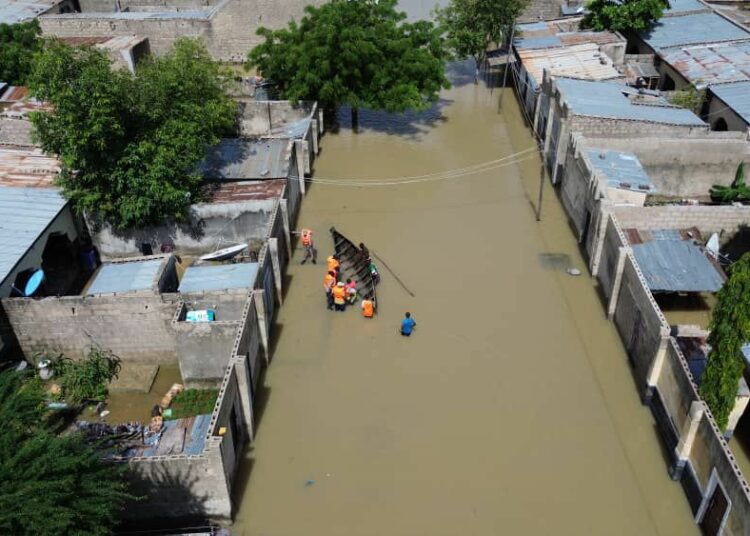It is almost a month since a devastating flood swept through Maiduguri, the Borno State capital, leaving in its wake a trail of unprecedented destruction and death.
The natural disaster, which swept away hundreds of homes, infrastructure, farmlands and businesses, among others, has been described by experts as the worst in 30 years, just as the death toll was initially put at 30. However, unofficial reports claim that the figure is much higher. The flood affected over one million people, while 414,000 others were reportedly displaced.
Since the incident occurred, the international community, the federal and state governments, prominent Nigerians, and corporate bodies have rallied around the Borno State government, mobilising funds and material resources to help the victims.
The solidarity is commendably overwhelming, and the empathy for the victims has proved that humanity still cares for its own in moments of distress. The federal and state governments reacted swiftly by taking initial steps to ameliorate the plight of the people who are still trying to cope with the activities of bandits and terrorists.
The state government set up a committee to assess the situation and recommend how quickly the victims can be resettled to continue with their lives. Already, the state government has received N7 billion from the N13 billion pledged by philanthropists, other public-spirited individuals, and corporate organisations.
As a newspaper, we commend the local, national, and global solidarity that has alleviated the disaster’s initial impact on the affected communities. However, despite these gestures from a caring world, the victims are yet to get the desired succour and corresponding solace.
So, as the floodwaters recede or dry up, it is imperative that the authorities quickly focus on the timely and proper resettlement and rehabilitation of the victims.
In our opinion, the task ahead requires sustained effort and coordination. With N7 billion cash donations and other pledges totaling N13 billion, these funds must be utilised efficiently to support rehabilitation efforts.
In making this appeal, we call to mind the situation in the Displaced Persons’ camps where materials meant for the people are recycled and sold in the open market. The authorities owe the flood victims a duty to protect them from the inanities of corrupt officials who might want to take undue advantage of the plight of the flood victims to feather their nests.
On the one hand, the money generated from public appeals must be deployed for the proper purpose: helping the victims get back on their feet and pick up the pieces of their lives.
On the other hand, we urge those who made pledges to promptly redeem them so that the government and its agencies can facilitate the recovery process as soon as possible, thereby reducing the pain inflicted by the unfortunate incident.
In our opinion, the primary concern is rebuilding the damage done by the flood and enabling affected businesses to regain lost steam. These measures require a comprehensive and holistic approach to addressing both immediate needs and the long-term sustainability of recovery efforts.
Because the victims were reduced to level zero, we call for a housing reconstruction programme for the homeless. We are encouraged by the state government’s determination to assist. Already, it has demonstrated the capacity to do the needful.
We suggest that this should be combined with economic empowerment to support business owners in rebuilding and restarting their enterprises.
Farmers who lost farmlands and crops should not be left out. They need seedlings and other farm inputs to begin life afresh.
An aggressive infrastructure development programme should also be implemented. This programme should focus on repairing and upgrading critical infrastructure, including roads and other public facilities that were destroyed.
From available records, victims of such disasters have not been well managed or treated fairly over the years.
Against this background, we caution humanitarian agencies such as the National Emergency Management Agency (NEMA) against adopting belated interventions, which often focus on cosmetic measures such as distributing mattresses and roofing sheets years after the disaster to the beneficiaries.
Instead, both NEMA and the Borno State government should collaborate to marshal out a workable rehabilitation plan for the victims.
The international community’s interest in the victims’ plight is encouraging, and we appeal for more understanding. As they work towards rehabilitation, it’s essential to acknowledge the resilience and strength of the affected communities.
Rehabilitating Borno State flood victims requires immediate attention, collective effort, and responsible management of donated funds.
All that is needed at this time is the willingness to rise to the challenge and ensure that those affected receive the support they need to rebuild their lives.





